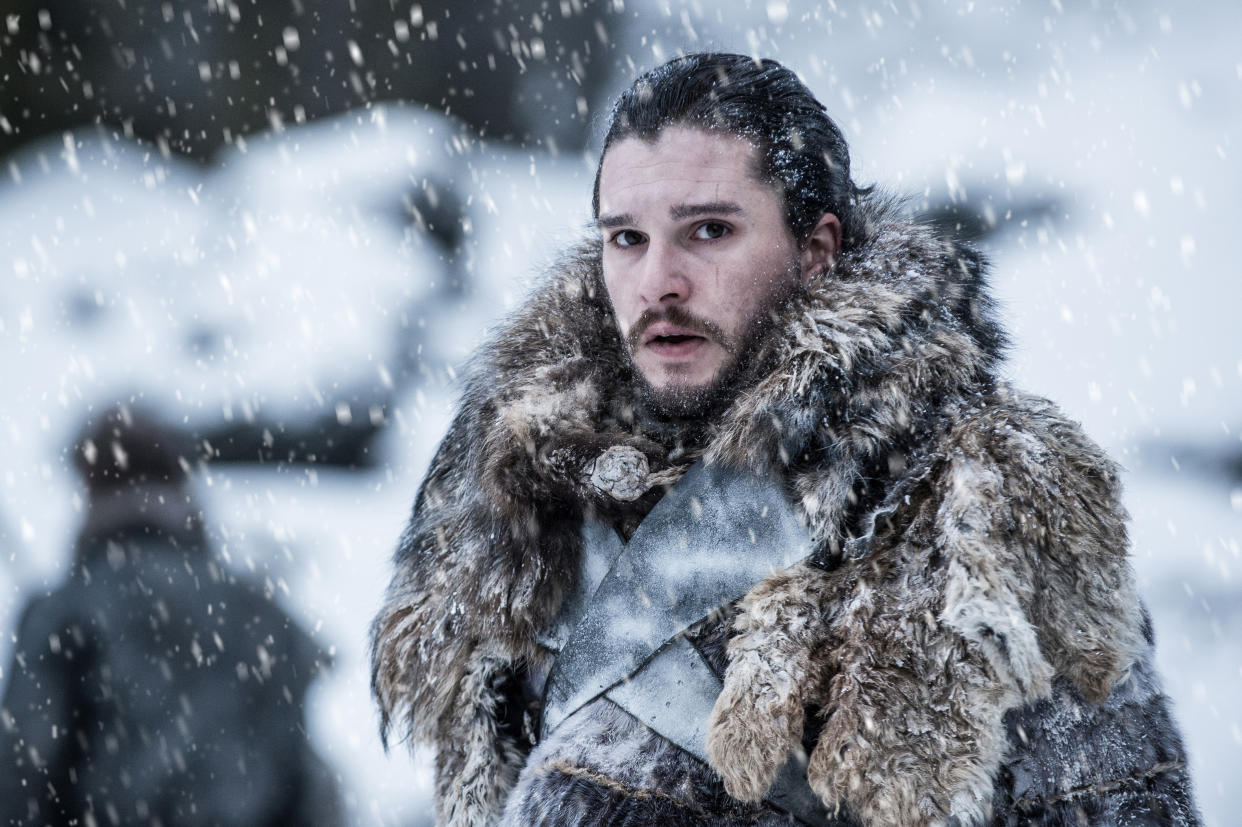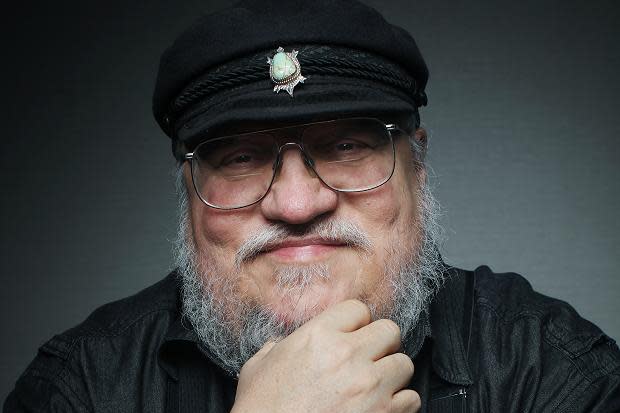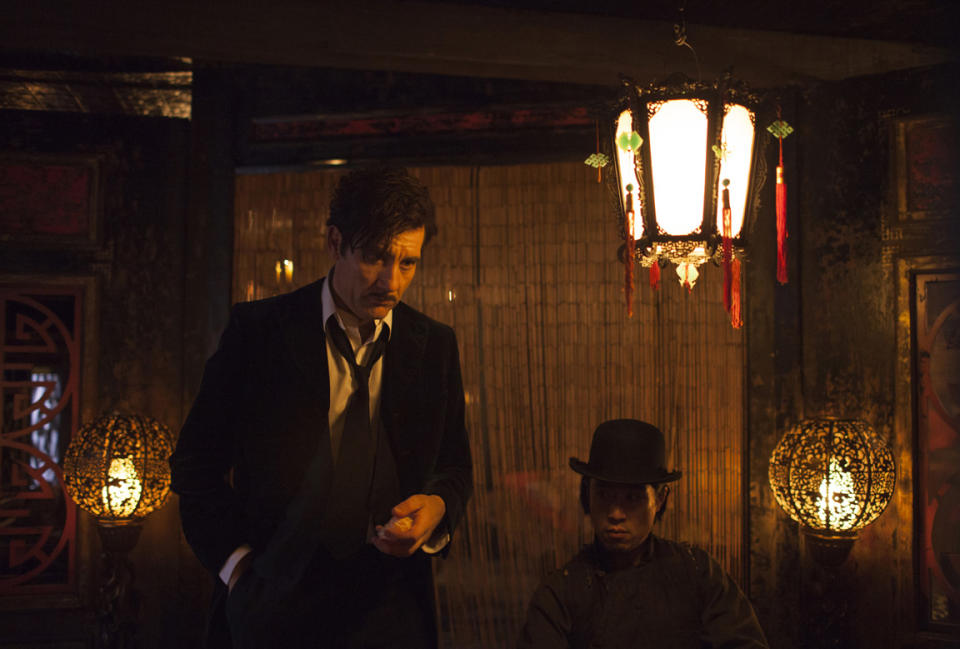‘Game Of Thrones’ Director On Tonight’s Game-Changing Icy Episode & Season 8

SPOILER ALERT: This story contains details of tonight’s penultimate episode of Game Of Thrones‘ Season 7.
EXCLUSIVE: Whatever Game Of Thrones is cooking up for next week’s Season 7 finale, it’s going to have to be big to beat tonight’s penultimate episode, where the Night King acquired the ultimate weapon in a dragon of his own and a barely alive but besotted Jon Snow acquiesced to eventually bend the knee to Daenerys Targaryen.

“Part of my episode was doing the job of braiding stories together that’ve been separate for a long time, braiding characters that’ve been separate for a long time, and that will only continue into Season 8,” director Alan Taylor says of last night’s more than 70-minute game-changing “Beyond The Wall” episode, which saw the marauding Night King both bring down and kill one of Dany’s trio of dragons and then resurrect Viserion for his own forces.
In many ways ice to the fire of August 6’s “The Spoils Of War” episode, the second to last GoT of the season has raised the stakes higher than ever for the battle-scared Westeros and the HBO blockbuster series based on George R.R. Martin’s books.

Sunday’s episode started out with Snow far from Winterfell and out on the treacherous ice with the uneasy fellowship of Jorah Mormont (Iain Glen), Gendry (Joe Dempsie), Tormund Giantsbane (Kristofer Hivju), Thoros (Paul Kaye), Beric Dondarrion (Richard Dormer) and the Hound (Rory McCann), whose rock throwing did no one any service later on as things slid even further out of control for the King of the North.
With the Night King and his now winged army on the move, burning swords, a fragile ice lake, a horde of White Walkers attacking Snow and his small crew, a last-ditch message to Dany, a vulnerability in the Wight forces, another Snow resurrection, various sibling rivalries and an alliance long in the making, the intricate in narrative and epic in scale episode penned by David Benioff and D.B. Weiss could have been a finale unto itself for many other series.
A GoT veteran from Seasons 1 and 2, Thor: The Dark World helmer Taylor talked to me about his return to the Benioff and Weiss EP’d series. He focused on how things have changed since the two-time Emmy winning Best Drama became one of the biggest shows in the world and what the consequences of “Beyond The Wall” are for the rest of Season 7 and Season 8, which starts filming its six-episode run in October. As yet more leaks hit the show this past week, the Emmy winner himself also unveiled a narrative nugget from Martin on the Kit Harington-portrayed Snow and Emilia Clarke’s Dany. Taylor additionally revealed the biggest challenge of tonight’s episode for him and why he thinks, no matter how big Game Of Thrones gets in the era of Peak TV, the show will always have an indie film ethos.
DEADLINE: So, as that last scene reveals, the Night King now has his own dragon. That’s a total game changer — he’s got the atomic bomb so to speak?

TAYLOR: I think some people sort of thought that kind of thing was coming. When I read the script the first time, I was really grateful to see that I got to kill one of the dragons, because I knew that was a major emotional point. Then I was really, you know, excited when I got to the end and realized how it was turning, because it’s obviously sort of a big lurch forward in terms of the oncoming battle. And then, you know, the episode was recently leaked, and I’m hoping at least some people are still surprised by those plot points because the secret of the episode was that that happened.
DEADLINE: I think the leaks and hacks attract very few eyeballs in the end. The viewership is hitting new highs week after week, so I think the surprise still has impact lurching forward to this season’s finale and the final season next year. But, with this penultimate episode of the penultimate season, what do you think is the significance of the episode, and where is it giving us perspective in the overall Game of Thrones game plan?
TAYLOR: First of all, I think there’s always been sort of a weight to the penultimate episode. It’s partly a Game Of Thrones thing, but it’s very much an HBO thing that I started to get used to working on Sopranos and things like that. There was a tendency for the second-to-last episode to deliver a pretty major turn, and for the final episode to be more of a denouement.
DEADLINE: Specifically to this season?

TAYLOR: Well, when I came into this season after being away for a while, what I realized was that this a season of seven episodes. Every episode is big, and there’s major things happening in every episode. So it wasn’t quite sort of the apex of the arc that some penultimate episodes are, but I was grateful that there was a sort of turning point or two that happened in the episode. So, I think the major emotional moment is probably the loss of one of Dany’s children, as she thinks of him. I think that’s also the major story point in terms of the developing power struggle, the fact that now the Night King has nuclear capability, as well as we do.
RelatedApple Music’s ‘Carpool Karaoke’ Rocks To New ‘Game Of Thrones’ Opening
DEADLINE: Along with the growing professional and personal relationship Emilia Clarke’s Dany character has with Kit Harington’s Jon Snow — literally coming to his rescue and losing one of her children, as you say. In the process, there is an inevitable rising storm of consequence, it seems…
TAYLOR: Part of my episode was doing the job of braiding stories together that’ve been separate for a long time, braiding characters that’ve been separate for a long time, and that will only continue into Season 8. Now everything’s converging, and that’s going to get only more so in Season 8 when really, all the storylines come together.
DEADLINE: With that tease in play, what would you say about what is to come in next week’s Season 7 finale and its lurch, to use that term again, into next year?

TAYLOR: What I enjoyed when I read all the scripts for this season and when I started to see what my fellow directors were doing, was that there was a thrill in realizing that this ball, this machine, is revving up bigger and rolling faster and with more inevitability. But it also has just as many surprises, and that just continues to happen. So, from my episode to the finale next week, the plot points of my episode are topped by the plot points in the episode coming, and Season 8 progresses in the same way.
DEADLINE: So David and D.B. are going out with a very big bang, or fireball?
TAYLOR: Well, the storylines are interweaving more tightly. The plot points are going to continue to sort of be like gut punches, and each of these characters that’ve been so fully fleshed out and so well-rounded are going to be moving towards their resolution, is what I’d say. I think people will be really surprised, but also fulfilled by where it goes. It’s going to keep building the way it’s been building, and I hope people stick around for it.
RelatedHBO Hack Could Be More Smoke Than Fire & Pilfered ‘Game Of Thrones’ Episodes
DEADLINE: With over 10 million viewers watching the 9 PM broadcast and growing each week, plus all those on the other platforms, I think it’s pretty clear they are going to stick around, if for nothing else to see what brews up between Jon and Dany…

TAYLOR: (Laughs) There’s been an inevitability to the two of them coming together. It’s been foreshadowed over and over again, and those who know the books know it’s inevitable, but that doesn’t tell you anything about how it’s going to play out or how it’s going to go. I remember when I was doing Season 1 and we were on location in Malta, and George R. R. Martin came to visit. He was sitting in a chair, and he was being really quite open about things that were to come…
DEADLINE: About Jon and Dany or Game Of Thrones in general?
TAYLOR: Bit of both, but it was early days and nobody was paying attention to the show. We didn’t really know what a phenomenon it was going to be, and I think he was being less guarded than we’ve become since then. Anyways, he alluded to the fact that Jon and Dany were the point, kind of. That, at the time, there was a huge, vast array of characters, and Jon was a lowly, you know, bastard son. So it wasn’t clear to us at the time, but he did sort of say things that made it clear that the meeting and the convergence of Jon and Dany were sort of the point of the series.
So, I was happy that a big step forward was taken in the episode I got to do this season is where he has fallen for her both, you know, emotionally and politically I think. He recognizes what she’s capable of, and is ready to bend the knee as soon as his knees bend. There’s still a step further to go with them in terms of the romantic side of things and a lot more to play out in terms of how the politics and the power struggle will work, but it was at least a sort of solid step forward in that major arc.
DEADLINE: A major arc overall of Game Of Thrones, with its Emmy wins and huge audience, has to be the expansion in the notion of what television is and can be. Certainly from the first days of this new small screen era with The Sopranos to the cinematic scenes of battle in the “Spoils Of War” episode a couple of weeks ago and in ‘Beyond The Wall,’ how has it changed from your behind the camera perspective?

TAYLOR: The most shallow part of answering that is that I had been on Game Of Thrones in Seasons 1 and 2, and, you know, we had much tighter budgets that we were trying to make as much as we could out of. For instance, I remember doing a scene where 20,000 men were supposed to ride out of the woods and we had 20 men.
And then I went off, did some big movies, some sort of blockbuster things, and by the time I came back to Game Of Thrones, I was stunned by how much it had grown in scale. HBO clearly is putting their money where their ambitions are with it, and I never experienced scale like this in television.
Yet, and this speaks to the caliber of people who work on the show, even in the bigger version of Game Of Thrones, there’s still a kind of guerrilla indie sensibility that’s driving the thing. I think it also feels like a smaller team creatively that’s driving it, and it doesn’t feel corporate at all. HBO is incredibly supportive and incredibly facilitating, but it doesn’t feel like there’s the long arm of some corporate entity that’s dictating how the show’s going to turn out. There’s no such thing as test screenings. So in terms of the making of it, it still feels more like an indie film, despite the fact that it’s gotten to such a massive level of scale.
DEADLINE: Sounds like philosophy of Peak TV that you’re working on there.

TAYLOR: Well, it’s exciting for sure, but the bigger development for me is I’ve been watching this happen for a while, it didn’t happen overnight. What’s been very satisfying is that television, for the longest time, has been a writer’s medium, and deservedly so, because the sustained stories and the characters really are what people are tuning in for, but I’ve been really happy to see it becoming more and more a director’s medium recently too. You see it in extreme forms with things like Steven Soderbergh doing The Knick and doing all episodes. So they all have the authorial touch of a director as well as the authorial touch of a writer.
Same thing with True Detective, the idea that these miniseries are coming out, which showcase as much the vision for the director as they do the vision of the writer, that’s always been the missing piece for me in television. That’s been what has made television non-cinematic.
So what I see now is kind of there was a golden age that came with great writing, and I got to participate in some of the early shows in that. Now I feel like there’s a sort of second wave as the directors become more and more active. You see it also played out in the personnel who are involved. That there’s less and less of a barrier between directors who work in the cinema and directors who work in television, because the crossover is much more fluid, and that’s, I think, an exciting development for directors professionally.
DEADLINE: To address that specifically, “Beyond The Wall” was really your Revenant in some ways, and not just because there was a crazed polar bear and a bodies left to die in the snow. To tap into that sense of scale again, what was shooting so many of those scenes in Iceland like for you and, even with all the green screen and CGI, what do you think that brought to the series?

TAYLOR: I was very happy to hear that my episode was going to be heavily in Iceland, actually. It’s one of my favorite places to shoot. I think any director who shoots there feels really blessed to have a chance to be in that environment. Sure, the first horror you realize is that in the winter, there’s about five hours of light, which makes the day seem impossible.
But the first time I went there for Game Of Thrones, I realized, “Oh, it’s five hours of light, but it’s also five hours of magic hour.” The sun never rises, you know, more than a few feet above the horizon. So it’s beautiful light all day long, so that makes a huge difference, and then, yes, being in the real environment changes everything for everybody.
DEADLINE: No one has to act too hard that they are struggling in that environment, I gather, whether they successfully grab a Wight or White Walker to show Cersei or not.

TAYLOR: Well, no. But the trick of the episode, of course, is that, while we are spending a lot of time in Iceland, we spent a lot of time in a parking lot in Belfast, as well. Because we were not going to be plunging people into water on a frozen lake in Iceland in the winter and then having to reset the ice and do it again.
So a big part of the action, a big part of the storytelling takes place in a quarry outside Belfast that’s been fully dressed, 360-degree views. They’re all camera ready, but you are walking on concrete, not walking on ice. So then this other layer of complexity comes in of anytime somebody falls into the ice, you know you’re shooting the element you’re shooting there. You’re shooting it again without them. You’re shooting on a green screen stage two months later, so you’re shooting in a dunk tank to get the splash, and that’s where the new scale of Game Of Thrones came home for me too.
DEADLINE: Was that the most challenging aspect of the episode for you as a director?

TAYLOR: I think probably the most challenging element of my episode was the presence of the dragons, and more than that, the close interaction with dragons.
Bringing a dragon up close is a very challenging thing to do, and Joe Bauer and his visual effects guys do it again and again. If you’d seen the rigs we had, the number of guys in green screen outfits. These flame-throwing mechanical rigs that were going to be replaced later, the huge Styrofoam green blobs that they climb onto when they were getting onto the dragon on the island. It’s amazing the amount of work that goes into something that looks relatively simple afterwards.
DEADLINE: Sounds like, returning to Game Of Thrones all these years later, you felt right at home.

TAYLOR: For me, it is worth saying that I noticed being with the Game Of Thrones team and then going away and coming back again, that it is a tremendously warm place to work. With the creative, the cast and the crew, partly because they’ve been there all along and partly because of what they do. I think also it’s partly they all know they’re being sort of celebrated with what they do, that it’s a great place to work. You feel like you’re working with a team at the top of its game that knows that it’s been given a chance that is very rare. So it’s a fun place to go to work.
Related stories
'GoT: Spoils Of War' Director Matt Shakman Named Geffen Playhouse Artistic Director
'Power' Hits Season High Viewership, Despite Online Leaks Of Starz Drama
'Big Brother' Ratings Steady, U.S. Gymnastics On NBC Up As CBS Wins Night
Get more from Deadline.com: Follow us on Twitter, Facebook, Newsletter

